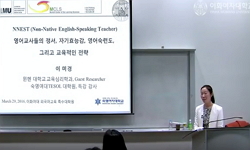The goal of this study is not only to understand the level of work ethics and self-efficacy of which personal assistants of the disabled are aware, but also to figure out whether personal assistants’ work ethics impact on self-efficacy. The followin...
http://chineseinput.net/에서 pinyin(병음)방식으로 중국어를 변환할 수 있습니다.
변환된 중국어를 복사하여 사용하시면 됩니다.
- 中文 을 입력하시려면 zhongwen을 입력하시고 space를누르시면됩니다.
- 北京 을 입력하시려면 beijing을 입력하시고 space를 누르시면 됩니다.

장애인활동보조인의 직업의식과 자기효능감에 관한 연구 = A Study on the Effect of Work Ethic of Personal Assistant for the Disabled on Self - Efficacy
한글로보기https://www.riss.kr/link?id=A108456508
- 저자
- 발행기관
- 학술지명
- 권호사항
-
발행연도
2014
-
작성언어
-
- 주제어
-
KDC
300
-
등재정보
KCI등재
-
자료형태
학술저널
-
수록면
73-97(25쪽)
- 제공처
-
0
상세조회 -
0
다운로드
부가정보
다국어 초록 (Multilingual Abstract)
After was represented a parent population of personal assistants, who worked at the disabled self-support centers, community welfare centers, the disabled communities, and local self-support centers located in Seoul and Gyeonggi-do, total 145 personal assistants’ data were collected and analyzed. Conclusions of the study were drawn as follows.
As a result of understanding the level of work ethics and self-efficacy, cognitive factors are represented with relatively high frequency, while motivational factors are with relatively low frequency.
Sense of belong and sense of duty give a significant impact on work ethics, attitudes do a relatively low impact on the ethics: factors of work ethics include commitments, sense of belong, sense of duty, continuous service will, and attitudes.
If correlation with independent variables were 0.9 or more, multicollinearity would be doubted, and a pure causal relationship among independent variables and dependent variables would be hard to validate despite meaningful regression model. However, this study did not show correlation with 0.9 or more.
As a result of analyzing the impact of sex, age, career, working hours, and work ethics on self-efficacy, it is not only found that sex, age, career, and working hours are non-significant, but also found that commitments are significant, among factors of work ethics - commitments, sense of belonging, sense of duty, continuous service will, and attitudes.
From this study, policy implications and empirical implications were elicited as follows
First, [policy implication] public service organization will have to mainly deal with career sustainability issues such as wage, benefit package, education, expertise recognition, communication, and so on.
Second, [empirical implication] efforts to foster self-efficacy program, business, and education will be required to induce and manage work ethics of personal assistants with positive attitudes.
The goal of this study is not only to understand the level of work ethics and self-efficacy of which personal assistants of the disabled are aware, but also to figure out whether personal assistants’ work ethics impact on self-efficacy. The following research subjects are established, emphasizing the importance of personal assistants, which give a significant impact on improving quality of life for severely disabled people, and coming up with grounds of social welfare promotion to improve quality of life.
After was represented a parent population of personal assistants, who worked at the disabled self-support centers, community welfare centers, the disabled communities, and local self-support centers located in Seoul and Gyeonggi-do, total 145 personal assistants’ data were collected and analyzed. Conclusions of the study were drawn as follows.
As a result of understanding the level of work ethics and self-efficacy, cognitive factors are represented with relatively high frequency, while motivational factors are with relatively low frequency.
Sense of belong and sense of duty give a significant impact on work ethics, attitudes do a relatively low impact on the ethics: factors of work ethics include commitments, sense of belong, sense of duty, continuous service will, and attitudes.
If correlation with independent variables were 0.9 or more, multicollinearity would be doubted, and a pure causal relationship among independent variables and dependent variables would be hard to validate despite meaningful regression model. However, this study did not show correlation with 0.9 or more.
As a result of analyzing the impact of sex, age, career, working hours, and work ethics on self-efficacy, it is not only found that sex, age, career, and working hours are non-significant, but also found that commitments are significant, among factors of work ethics - commitments, sense of belonging, sense of duty, continuous service will, and attitudes.
From this study, policy implications and empirical implications were elicited as follows
First, [policy implication] public service organization will have to mainly deal with career sustainability issues such as wage, benefit package, education, expertise recognition, communication, and so on.
Second, [empirical implication] efforts to foster self-efficacy program, business, and education will be required to induce and manage work ethics of personal assistants with positive attitudes.
동일학술지(권/호) 다른 논문
-
- 한국장애인개발원
- 오혜경 ( Oh Hea-kyung )
- 2014
- KCI등재
-
체육활동이 지적장애인의 신체변화와 행동적응 및 만족도에 미치는 영향
- 한국장애인개발원
- 백삼현 ( Baek Sam-hyun )
- 2014
- KCI등재
-
발달장애 청소년 가족의 토요음악활동에 대한 효과성 연구
- 한국장애인개발원
- 최원희 ( Choi Won-hee )
- 2014
- KCI등재
-
- 한국장애인개발원
- 이복실 ( Lee Bok-sil )
- 2014
- KCI등재




 KISS
KISS






